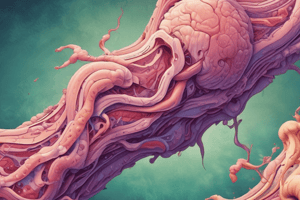Podcast
Questions and Answers
What is the primary function of epithelial tissue?
What is the primary function of epithelial tissue?
- To enable movement and contraction
- To transmit and process information
- To provide structural support to the body
- To form the lining of body surfaces and organs (correct)
Which type of tissue is responsible for movement and contraction?
Which type of tissue is responsible for movement and contraction?
- Connective tissue
- Epithelial tissue
- Muscle tissue (correct)
- Nervous tissue
What is a characteristic of tissues?
What is a characteristic of tissues?
- They are not specialized
- They are composed of cells and have specialized functions (correct)
- They are not organized into specific structures
- They are not composed of cells
What is an example of connective tissue?
What is an example of connective tissue?
What is a function of nervous tissue?
What is a function of nervous tissue?
What occurs during tissue growth?
What occurs during tissue growth?
What is an example of tissue-tissue interaction?
What is an example of tissue-tissue interaction?
What is a characteristic of some tissues?
What is a characteristic of some tissues?
Flashcards are hidden until you start studying
Study Notes
Types of Tissues
- Epithelial Tissue: forms the lining of body surfaces, glands, and organs; functions in protection, absorption, and secretion
- Examples: skin, lung alveoli, gut lining
- Connective Tissue: provides support, structure, and connectivity to the body; composed of cells and a matrix
- Examples: bone, cartilage, fat, blood, tendons, ligaments
- Muscle Tissue: responsible for movement and contraction
- Examples: skeletal muscle, smooth muscle, cardiac muscle
- Nervous Tissue: transmits and processes information
- Examples: neurons, glial cells
Functions of Tissues
- Protection: epithelial tissue protects the body from external damage and infection
- Support: connective tissue provides structural support and framework for the body
- Movement: muscle tissue enables movement and contraction
- Regulation: nervous tissue regulates various bodily functions and processes information
- Absorption: epithelial tissue absorbs nutrients and substances
- Secretion: epithelial tissue secretes hormones, enzymes, and other substances
Characteristics of Tissues
- Cellularity: tissues are composed of cells
- Specialization: tissues have specialized functions and structures
- Organization: tissues are organized into specific structures and patterns
- Regeneration: some tissues have the ability to regenerate and repair themselves
- Differentiation: tissues can differentiate into specialized cells and structures
Tissue Interactions
- Tissue-Tissue Interactions: tissues interact with each other to perform specific functions
- Cell-Cell Interactions: cells within tissues interact with each other to coordinate functions
- Cell-Matrix Interactions: cells interact with the matrix to maintain tissue structure and function
Tissue Development and Repair
- Tissue Formation: tissues form during embryonic development and growth
- Tissue Growth: tissues grow and increase in size through cell division and differentiation
- Tissue Repair: tissues repair and regenerate in response to injury or damage
- Tissue Remodeling: tissues adapt and change structure in response to changes in the body
Types of Tissues
- Epithelial tissue forms the lining of body surfaces, glands, and organs, and functions in protection, absorption, and secretion
- Connective tissue provides support, structure, and connectivity to the body, and is composed of cells and a matrix
- Muscle tissue is responsible for movement and contraction
- Nervous tissue transmits and processes information
Functions of Tissues
- Epithelial tissue protects the body from external damage and infection
- Connective tissue provides structural support and framework for the body
- Muscle tissue enables movement and contraction
- Nervous tissue regulates various bodily functions and processes information
- Epithelial tissue absorbs nutrients and substances
- Epithelial tissue secretes hormones, enzymes, and other substances
Characteristics of Tissues
- Tissues are composed of cells (cellularity)
- Tissues have specialized functions and structures (specialization)
- Tissues are organized into specific structures and patterns (organization)
- Some tissues have the ability to regenerate and repair themselves (regeneration)
- Tissues can differentiate into specialized cells and structures (differentiation)
Tissue Interactions
- Tissues interact with each other to perform specific functions (tissue-tissue interactions)
- Cells within tissues interact with each other to coordinate functions (cell-cell interactions)
- Cells interact with the matrix to maintain tissue structure and function (cell-matrix interactions)
Tissue Development and Repair
- Tissues form during embryonic development and growth (tissue formation)
- Tissues grow and increase in size through cell division and differentiation (tissue growth)
- Tissues repair and regenerate in response to injury or damage (tissue repair)
- Tissues adapt and change structure in response to changes in the body (tissue remodeling)
Studying That Suits You
Use AI to generate personalized quizzes and flashcards to suit your learning preferences.



